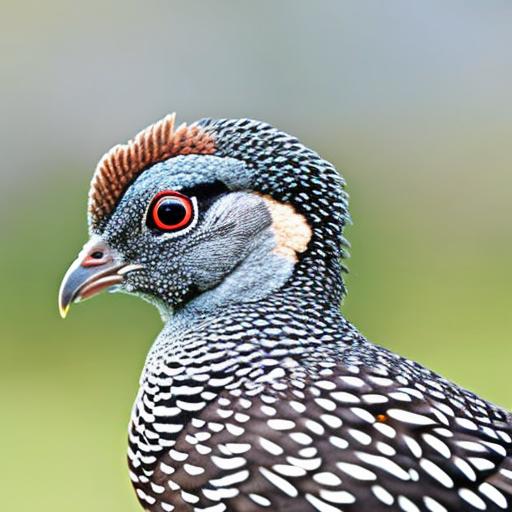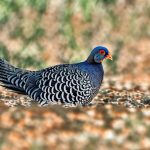Guinea fowl, also known as pintades, are a unique and fascinating addition to any backyard poultry flock. These birds are native to Africa and have been domesticated for thousands of years. They are known for their striking appearance, with speckled feathers and a distinctive helmet-like crest on their heads. Guinea fowl are not only beautiful to look at, but they also serve a practical purpose in the backyard. They are excellent foragers and can help control pests such as ticks, flies, and even snakes. In addition, they are relatively low-maintenance and can thrive in a variety of climates, making them an ideal choice for backyard poultry keeping.
Guinea fowl are also known for their distinctive vocalizations, which can serve as a natural alarm system to alert you to potential predators or intruders. They are also highly social birds and enjoy the company of their flock mates, making them a joy to watch and interact with. Whether you are a seasoned poultry keeper or new to raising backyard birds, guinea fowl can be a rewarding and entertaining addition to your flock.
Key Takeaways
- Guinea fowl are a popular choice for backyard poultry keeping due to their low maintenance and pest control abilities.
- Keeping guinea fowl in your backyard can help control pests like ticks, flies, and small rodents, reducing the need for chemical pest control.
- Guinea fowl require a secure and spacious housing environment with access to outdoor space for foraging and dust bathing.
- A balanced diet for guinea fowl includes a mix of commercial poultry feed, grains, and access to insects and greens for natural foraging.
- Regular health checks, vaccination, and proper sanitation are essential for preventing diseases in guinea fowl, while providing a stress-free environment is key to their well-being.
The Benefits of Keeping Guinea Fowl in Your Backyard
There are numerous benefits to keeping guinea fowl in your backyard. One of the most significant advantages is their pest control abilities. Guinea fowl are voracious insect eaters and can help keep your yard free of ticks, flies, and other pests. This can be especially beneficial if you live in an area with a high prevalence of ticks, as guinea fowl can help reduce the risk of tick-borne illnesses for both humans and other animals on your property.
In addition to their pest control abilities, guinea fowl are also relatively low-maintenance birds. They are hardy and adaptable, able to thrive in a variety of climates and environments. They are also excellent foragers and can supplement their diet with insects, seeds, and other natural foods found in your yard. This can help reduce the cost of feeding them and make them a cost-effective addition to your flock. Furthermore, guinea fowl are highly social birds and can provide entertainment and companionship for both you and your other poultry. Their unique vocalizations and playful behavior make them a joy to watch and interact with, adding a lively energy to your backyard.
Choosing the Right Housing and Environment for Guinea Fowl
When it comes to housing and environment for guinea fowl, there are several key factors to consider. First and foremost, guinea fowl require a secure and predator-proof coop or housing structure to keep them safe from potential threats such as foxes, raccoons, and birds of prey. The coop should provide adequate space for the number of guinea fowl in your flock, with at least 3-4 square feet per bird. It should also have roosting bars or platforms for the guinea fowl to perch on at night, as well as nesting boxes for laying eggs.
In addition to a secure coop, guinea fowl also need access to a spacious outdoor area where they can forage and roam freely. A fenced-in yard or pasture is ideal for providing them with the space they need to exercise and explore. It’s important to ensure that the outdoor area is well-protected from predators and that there is ample shade and shelter from the elements. Guinea fowl also appreciate access to dust baths, so providing them with a designated area filled with sand or fine dirt can help keep their feathers clean and free of parasites.
Feeding and Nutrition for Guinea Fowl
Feeding and nutrition are crucial aspects of caring for guinea fowl in your backyard. While guinea fowl are excellent foragers and can supplement their diet with insects and natural foods found in your yard, it’s important to provide them with a balanced commercial poultry feed as well. Look for a high-quality feed specifically formulated for guinea fowl or game birds, which will provide them with the essential nutrients they need to thrive.
In addition to commercial feed, you can also offer guinea fowl supplemental treats such as fruits, vegetables, and grains. They enjoy a variety of foods including leafy greens, berries, melons, and whole grains. It’s important to avoid feeding them foods that are toxic to poultry, such as avocado, chocolate, or onions. Providing access to fresh, clean water at all times is also essential for keeping your guinea fowl healthy and hydrated.
It’s important to monitor your guinea fowl’s body condition and adjust their feeding regimen as needed to ensure they are maintaining a healthy weight. Overfeeding can lead to obesity and related health issues, while underfeeding can result in malnutrition and poor egg production. By providing a balanced diet and monitoring their food intake, you can help ensure that your guinea fowl remain healthy and thriving in your backyard.
Health and Disease Management for Guinea Fowl
Maintaining the health of your guinea fowl is essential for their well-being and productivity in your backyard. Regular health checks and observation of their behavior can help you identify any potential issues early on. Look for signs of illness such as lethargy, loss of appetite, abnormal droppings, or respiratory symptoms. If you notice any concerning symptoms, it’s important to consult with a poultry veterinarian who can provide guidance on diagnosis and treatment.
In addition to regular health checks, it’s important to practice good biosecurity measures to prevent the spread of disease within your flock. This includes quarantining new birds before introducing them to your existing flock, as well as maintaining clean living conditions and practicing good hygiene when handling your guinea fowl. Providing a clean and dry living environment, regular cleaning of feeders and waterers, and proper waste management can all help reduce the risk of disease transmission.
Vaccinations may also be recommended by a veterinarian to protect your guinea fowl from common poultry diseases such as Marek’s disease or Newcastle disease. It’s important to follow recommended vaccination schedules and protocols to ensure that your guinea fowl have the best possible protection against these diseases. By prioritizing their health and implementing good biosecurity practices, you can help keep your guinea fowl healthy and thriving in your backyard.
Breeding and Raising Guinea Fowl Chicks

Breeding guinea fowl can be a rewarding experience for backyard poultry keepers. If you are interested in breeding guinea fowl, it’s important to provide them with the right conditions for successful mating and egg production. Guinea fowl are seasonal layers, typically laying eggs in the spring and summer months. Providing them with a quiet and secluded nesting area can encourage them to lay eggs, while ensuring that they have access to a balanced diet and plenty of fresh water is essential for successful breeding.
Once your guinea fowl have laid eggs, you can choose to allow them to incubate the eggs themselves or collect the eggs for artificial incubation. If you opt for artificial incubation, it’s important to follow proper protocols for temperature, humidity, and turning of the eggs to maximize hatch rates. Guinea fowl eggs typically have an incubation period of around 26-28 days before hatching.
Raising guinea fowl chicks requires providing them with a warm and secure brooder environment until they are old enough to join the adult flock. This includes access to heat lamps or heating pads, as well as a balanced chick starter feed formulated specifically for young poultry. As they grow, you can gradually introduce them to the outdoor environment under supervised conditions until they are ready to join the adult flock full-time.
Tips for Integrating Guinea Fowl with Other Backyard Poultry
Integrating guinea fowl with other backyard poultry such as chickens or ducks requires careful planning and consideration of their unique behaviors and social dynamics. Guinea fowl have a strong flock mentality and may exhibit aggressive behavior towards other birds if not properly introduced. It’s important to introduce new birds gradually and under supervised conditions to minimize stress and potential conflicts.
Providing adequate space for all birds in the flock is essential for reducing competition and aggression. This includes ensuring that there are enough roosting spaces, nesting boxes, and feeding areas for all birds to access without feeling crowded or threatened. Additionally, providing environmental enrichment such as perches, dust bathing areas, and hiding spots can help reduce boredom and aggression within the flock.
It’s also important to monitor the dynamics within the flock closely after introducing new birds to ensure that everyone is getting along harmoniously. In some cases, it may be necessary to separate birds temporarily if conflicts arise until they have had time to establish a pecking order and become accustomed to each other’s presence. By taking these steps and providing a well-managed environment, you can successfully integrate guinea fowl with other backyard poultry and create a harmonious multi-species flock in your backyard.
In conclusion, keeping guinea fowl in your backyard can be a rewarding experience that offers numerous benefits including pest control, entertainment, and companionship. By providing them with the right housing, nutrition, healthcare, breeding conditions, and integrating them carefully with other poultry species, you can create a thriving flock that brings joy and practical benefits to your backyard environment. Whether you are an experienced poultry keeper or new to raising backyard birds, guinea fowl are an excellent choice for adding diversity and vitality to your flock. With proper care and attention, these unique birds can become valued members of your backyard community for years to come.
If you’re interested in backyard poultry keeping, you might also want to check out this article on large chicken coop ideas. Having a spacious and well-designed coop is essential for the health and happiness of your guinea fowl and other poultry. Learn more about creating the perfect living space for your feathered friends here.
FAQs
What are guinea fowl?
Guinea fowl are a type of domesticated bird that are commonly kept for their pest control abilities and for their flavorful meat and eggs.
What do guinea fowl eat?
Guinea fowl are omnivores and their diet consists of a variety of foods including insects, seeds, grains, and small reptiles.
How do you care for guinea fowl in a backyard setting?
Guinea fowl require a secure coop or shelter to protect them from predators, access to fresh water, and a balanced diet. They also need space to roam and forage.
Are guinea fowl noisy?
Guinea fowl are known for their loud calls and can be quite noisy, especially when they feel threatened or are disturbed.
Do guinea fowl get along with other backyard poultry?
Guinea fowl can be kept with other poultry such as chickens and ducks, but they may be more aggressive and territorial compared to other birds.
What are the benefits of keeping guinea fowl in a backyard setting?
Guinea fowl are excellent at controlling pests such as ticks, flies, and other insects. They also provide flavorful meat and eggs for consumption.
Do guinea fowl require any special medical care?
Guinea fowl generally have strong immune systems and are resistant to many common poultry diseases. However, they may require occasional deworming and preventative measures against parasites.
Meet Walter, the feathered-friend fanatic of Florida! Nestled in the sunshine state, Walter struts through life with his feathered companions, clucking his way to happiness. With a coop that’s fancier than a five-star hotel, he’s the Don Juan of the chicken world. When he’s not teaching his hens to do the cha-cha, you’ll find him in a heated debate with his prized rooster, Sir Clucks-a-Lot. Walter’s poultry passion is no yolk; he’s the sunny-side-up guy you never knew you needed in your flock of friends!







